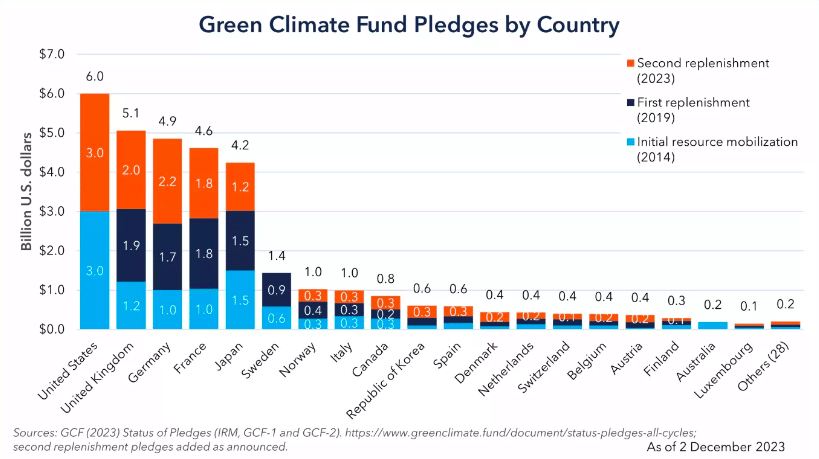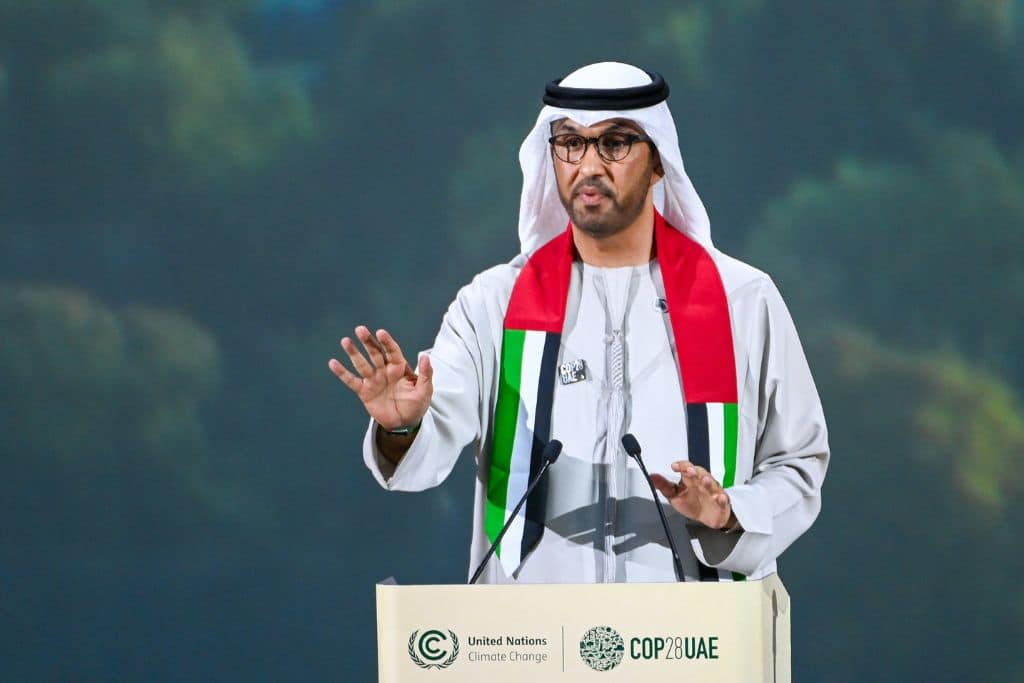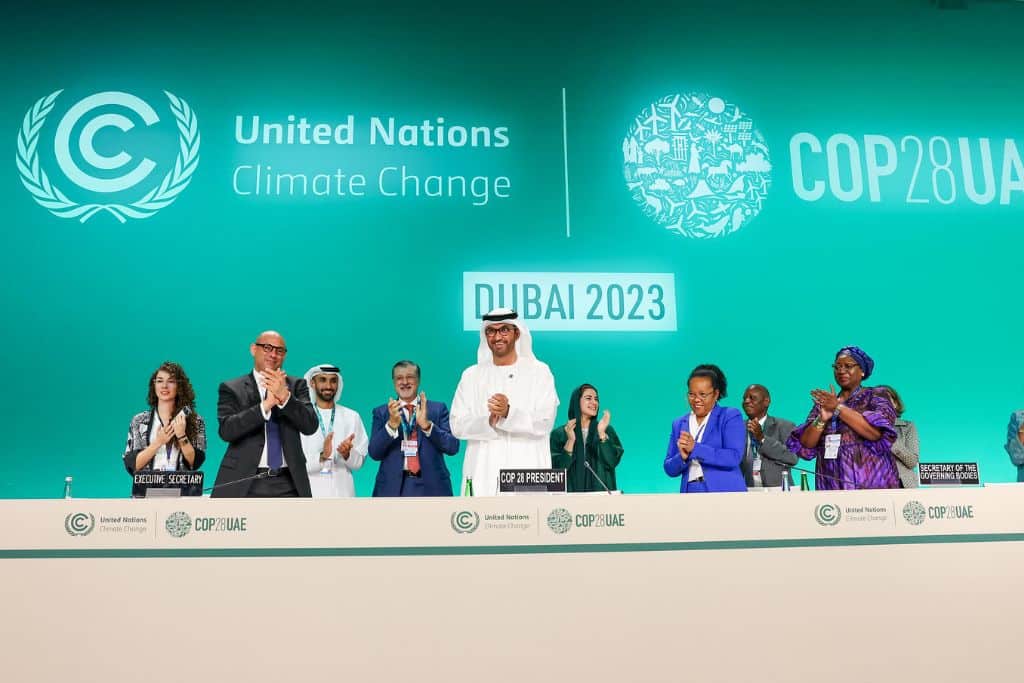The 28th United Nations climate change conference (COP28) kicked off on November 30 in Dubai, United Arab Emirates (UAE). Attended by more than 95,000 people – including more than 100 heads of state, delegations of 199 countries, and at least 2,456 fossil fuel lobbyists – the climate summit holds immense importance. As set out in the 2015 Paris Climate Agreement, COP28 will mark a historic milestone by conducting the first Global Stocktake, a comprehensive assessment that will evaluate the progress made by nations towards their climate goals. Here’s a recap of everything that happened during COP28 week 1.
—
Day 1 (November 30) – Opening Day
- Opening remarks: Sultan Al Jaber, COP28 president, pledged to “run an inclusive and transparent process, one that encourages free and open discussion between all parties.” He added that many companies have 2050 net-zero goals and that the COP presidency will work closely with high-emitting sectors, including heavy transportation, aluminum, steel, and cement, to accelerate decarbonization at scale.
- Loss and Damage: Day 1 saw a landmark agreement reached on the operationalisation of the Loss and Damage Fund – a fund set up at last year’s COP27 to help low-income countries pay for climate-related damages. The agreement means wealthy states and major polluters will put millions of dollars towards the World Bank-hosted fund. Contributions to the fund reached US$260 million. Among the wealthy nations pledging money were COP28 host UAE ($100 million), Germany ($100 million), the UK ($50 million), Japan ($10 million) and the US ($17.5 million). Developed countries have also called on high-emitting nations which are not fully developed, such as China and Saudi Arabia, to make contributions to the fund as well.
More on the topic: Rich Nations Pledge $260 Million For Climate Loss and Damage Fund on COP28 Opening Day
Day 2 (December 1) – World Climate Action Summit
At the World Climate Action Summit (December 1-2), heads of state and world leaders came together to tackle the most pressing climate issues in dialogue with leaders from civil society, business, the youth, and Indigenous Peoples’ organizations.
- Opening remarks: UN Secretary-General António Guterres called for a phase-out of fossil fuels with a clear timeframe aligned with 1.5C and a just, equitable transition to renewables. Addressing fossil fuel representatives, he said: “Your old road is rapidly aging. Do not double-down on an obsolete business model. Lead the transition to renewables.”
- Food security: 134 countries representing 5.7 billion people, 500 million farmers and 75% of all emissions from global food systems endorsed the Emirates Declaration on Sustainable Agriculture, Resilient Food Systems and Climate Action, putting food at the centre of the climate talks. The Food System Declaration is a result of one year of negotiations between the COP28 Presidency and farmer groups and civil society organisations from Africa. It commits governments to formally include food and agriculture in national climate plans for the first time and to scale up funding.
- Fossil Fuels: Colombia has officially endorsed the Fossil Fuel non-Proliferation Treaty, becoming the first Latin American country as well as the largest fossil fuel producer to join this bloc of pioneer countries seeking a negotiation mandate for a fossil fuel phaseout. The push for a Treaty is spearheaded by a bloc of 10 nation-states from Latin America, the Pacific, the Caribbean and South East Asia. The global network behind the proposal is now formed by 2,200 civil society organisations, over 3,000+ scientists and academics and Nobel laureates, and the World Health Organisation (WHO). 100 cities including Los Angeles, Kolkata, Lima, Vancouver, London, and Warsaw, more than 600 Parliamentarians across the world and a growing number of businesses have also joined the calls.
- Climate finance: The UAE announced it will put US$30 billion to a new climate investment facility that aims to attract $250 billion of investment by the end of the decade.
- Methane: The UN Environment Programme (UNEP) published the Eye on Methane Report, which looks at the progress made globally to cut methane emissions. According to the report, anthropogenic methane emissions drive roughly 30% of the global warming, though with already available technologies, we can address roughly 45% of these emissions.
Day 3 (December 2) – World Climate Action Summit
- Climate finance: Vice President Kamala Harris said that the Biden-Harris Administration will pledge an additional $3 billion in funding to the UN Green Climate Fund created in 2010 to support climate action in developing countries. It comes on top of $9.3 billion in new commitments already announced by the UK, France, Germany, Japan and other nations.

- Methane: The US announced new rules to slash planet-warming methane emissions from oil and gas by nearly 80%. Besides that, a coalition of 50 oil and gas companies – including ExxonMobil, Saudi Aramco, and Adnoc, ConocoPhillips, and BP – signed up to the Oil and Gas Decarbonisation Charter sponsored by COP28 president Sultan Al Jaber, himself the head of one of the world’s top oil companies – Adnoc, pledging to set targets to cut emissions from their own operations, though none pledged to cut production. While the targets are not legally binding, signatories – which together account for about one-third of global oil and gas production – have to submit a plan to meet them by 2025.
- Renewables: 116 countries have signed the Global Renewables and Energy Efficiency Pledge, agreeing to triple worldwide installed renewable energy generation capacity to at least 11,000GW and to double the global average annual rate of energy efficiency improvements from 2% to more than 4% ever year until the end of this decade.
- Hydrogen: 39 countries endorsed the UAE Hydrogen Declaration of Intent to pursue mutual recognition of hydrogen certification schemes and help unlock global trade in low-carbon hydrogen.
- Coral reefs: The International Coral Reef Initiative (ICRI), a network including 45 countries that represent over 75% of the world’s coral reefs, has launched the Coral Reef Breakthrough, which sets the first global targets for coral reefs: to secure the future of at least 50% of remaining shallow-water tropical coral reefs with investments of at least US$12 billion to support the resilience of more than half a billion people globally by 2030.
- Forests: Leaders of Ghana, the Democratic Republic of Congo, the Republic of Congo, and Papua New Guinea delivered country packages on nature, forests and peatlands under the Forests and Climate Leaders’ Partnership (FCLP). The packages reflect these countries’ commitment to achieving 2030 national and international forest targets, by protecting and restoring forests in the three major tropical forest basins – the Amazon, Congo Basin and Asia-Pacific.
- Oceans: Bloomberg Philanthropies CEO Patti Harris, U.S. Special Presidential Envoy on Climate John Kerry, UN Secretary General’s Special Envoy for the Ocean Peter Thomson, and others announced the formation of Ocean Resilience and Climate Alliance (ORCA), pledging more than US$250 for ocean resilience and and ocean-based climate solutions.
Day 4 (December 3) – Health Day + Relief, Recovery & Peace
For the first time in the history of the annual climate change conference, COP28 featured peace, relief, and recovery as a thematic day.
- Loss and Damage: Countries agreed on the host for the Santiago Network for loss and damage, , whose secretariat will be hosted by United Nations for Disaster Risk Reduction (UNDRR) and United Nations Office for Project Services (UNOPS). The Network will provide technical assistance and resources to vulnerable developing countries on averting, minimising and addressing loss and damage. The draft text is out for adoption by Parties.
- Health: 124 countries endorsed the COP28 UAE Climate and Health Declaration, which commits to putting health at the centre of climate action and accelerating the development of climate-resilient, sustainable and equitable health systems. Several finance commitments were announced as part of the initiative, including a $300 million commitment by the Global Fund to prepare health systems, $100 million by the Rockefeller Foundation to scale up climate and health solutions, and an announcement by the UK Government of up to £54 million ($68 million). According to Humans Rights Watch, the declaration fails to address fossil fuels as the main source of GHG emissions driving climate change and air pollution.
- Emissions: A global coalition co-founded by former US Vice President Al Gore launched Climate TRACE, a granular database that uses machine learning, satellites and other technology to track global greenhouse gas (GHG) emissions, from individual power plants, steel mills, and mining operations down to the individual polluter. Some of the world’s biggest companies are planning to use this data to decarbonize their supply chains.
- Faith: Pope Francis and the Grand Imam of Al-Azhar Ahmed Al-Tayeb have signed a declaration of support for urgent climate action, giving video addresses to COP28 attendees during the Inauguration of the first-ever Faith Pavilion with messages of urgency and hope for robust climate action. The Pavilion, the pope said, “is the first of its kind at the heart of a COP, and it shows that all authentic religious beliefs are a source of encounter and action.”
- Activism: COP28 saw its first major day of protests inside the Blue Zone, a rare sight in the autocratic UAE. Despite UN-mandated restrictions preventing them from raising Palestinian flags and chanting certain slogans, more than 100 activists marched to demand a ceasefire in Gaza.
Day 5 (December 4) – Finance, Trade, Gender Equality & Accountability Day
The day focussed on creating momentum for international finance and trade to support the implementation of adaptation and mitigation solutions in an effective and equitable way that also takes gender equality into account.

- Methane: The World Bank launched the Global Flaring and Methane Reduction (GFMR) Partnership, a multi-donor trust fund that will mobilise an initial $250 million to help developing nations cut carbon dioxide and methane emissions generated by the oil and gas industry. The initiative secured $25 million each from six major oil companies, including BP, Eni, Shell, and TotalEnergies. Some countries also pledged money to the fund, including the UAE ($100 million), the US ($2 million), Germany ($1.5 million), and Norway ($1 million). Remarkably, big players Chevron and Exxon Mobil opted out. The bank also announced its intent to launch at least 15 country-led programs in the next 18 months with the aim to slash up to 10 million tons of methane.
- Climate finance: The World’s largest multilateral development banks and other international financial institutions signed a Joint Declaration and launched a global “task force” to address high debt burdens, climate change, and biodiversity loss. Led by Inter-American Development Bank (IDB) and United States International Development Finance Corporation (DFC), the Taskforce is set to meet for the first time in January 2024.
- Global Stocktake negotiations: Ministers from Germany, Colombia and Granada, along with high-level representatives from the UNFCCC and UN CBD call on other Parties to enhance political leadership and implementation of nature-based solutions at scale for climate action.
- Controversies: Al Jaber faced a fallout for resurfaced comments he made at an online event a few weeks ago where he said there was “no science” behind claims that a phase-out of fossil fuels is needed to limit global warming to 1.5C. In reaction to the report, Al Jaber said on Monday: “We very much believe and respect the science.” The Ministerial meeting addressed the need for synergistic and integrated action on nature and climate, following the recent adoption of the Kunming-Montreal Global Biodiversity Framework (KMGBF) and COP28 Presidency priorities agenda for Nature, Land Use and Oceans.
More on the topic: COP28 Al Jaber Says There Is No Scientific Evidence That Fossil Fuel Phase-Out Is Needed for 1.5C Goal: Reports
Day 6 (December 5) – Energy and Industry, Just Transition & Indigenous Peoples Day
The day focussed on how the world can speed up a just energy transition, looking at the broad spectrum of solutions we have to decarbonise the energy sector. The focus was also on Indigenous Peoples, stewards of 80% of our planet’s biodiversity.
- Emission: The Global Carbon Project launched the latest Global Carbon Budget Report. The report suggests that global fossil carbon dioxide (CO2) emissions this year are set to hit a record high of 36.8 billion tonnes, an increase of 1.1% relative to 2022 levels and 1.4% above pre-pandemic levels, preliminary data shows. Paired with emissions deriving from land-use change – such as deforestation – global CO2 emissions will likely reach 40.9 billion tonnes.
- Food security: Over 50 leading food organisations and NGOs including the World Wildlife Fund (WWF), the Food and Land Use Coalition (FOLU), and the Bezos Earth Fund have released a joint statement calling for food systems to be included in the Global Stocktake decision. “The findings of the IPCC and the global stocktake technical phase are unequivocal – we will not achieve any of the long-term goals of the Paris Agreement without more ambitious, comprehensive, and equitable climate action on food,” the statement reads.
- COP28 final agreement: A newly released draft of the COP28 final agreement shows that negotiators are considering calling for an “orderly and just” phase out of fossil fuels. A second option in the draft text, however, called for “accelerating efforts towards phasing out unabated fossil fuels.”
- Cooling: As the newly released UNEP Global Cooling Watch Report warned that cooling emissions are expected to reach between 4.4 billion and 6.1 billion metric tons of carbon dioxide equivalent by mid-century, 63 countries, including the US, Canada, and Kenya, joined the Global Cooling Pledge in the world’s first collective effort to tackle climate-warming emissions from cooling, which include refrigeration for food and medicine and air conditioning. If fulfilled, the pledge, developed by UNEP alongside the COP28 presidency, could save 78 billion tonnes CO2 equivalent by 2050.
- Soil: The Save Soil movement launched the ‘SoilForClimateAction’ Campaign at COP28 to mark World Soil Day 2023. The campaign and collective partnership of organisations, will seek to raise awareness about the importance of healthy soil and its ability to buffer us against climate change as well as to influence policymakers to implement pro-soil policies across the globe.
More on soil: Op-Ed: The Private Sector Must Prioritise Investments in Soil Health
Day 7 (December 6) – Multilevel Action, Urbanization and Built Environment Day
On this day, mayors and governors, ministers and parliamentarians, global business leaders and civil society came together to discuss climate action solutions across every aspect of society, including green urban mobility, sustainable waste management systems, and greener cities.
- Agriculture: Social enterprise One Acre Fund in partnership International Finance Corporation, U.S. International Development Finance Corporation and the African Risk Capacity launched ‘One Acre Fund Re’, a reinsurance fund with the called that will provide a critical financial safety net for one million smallholder farmers in 2024 in the face of devastating impacts on crop yields. One Acre Fund aims to scale coverage to at least 4 million farmers by 2030. Natural disasters have caused about $3.8tn worth of lost crops and livestock production over the past three decades globally, yet only 3% of African farmers have insurance coverage.
- Global Stocktake: Over 100 parties, including WWF, FOLU and the Food Systems Partnership, signed a joint statement in reaction to the latest draft of the Global Stocktake Decision text, calling for agriculture and food systems to be included.
- Biodiversity: The World Economic Forum (WEF) launched a new guide covering some of how companies could support value creation through the use of biodiversity credits. The report identifies a set of interrelated use cases for biodiversity credits: to enhance carbon credits for better nature outcomes, to access ecosystem services as inputs, to contribute to nature recovery beyond own impact, and to offer projects bundled with nature recovery.
Featured image: UNclimatechange/Flickr
This is part 1 of the COP28-Recap series. Check out ‘COP28 Week 2 Recap’ here. For Earth.Org’s full COP28 coverage, visit earth.org/cop28.
You might also like: What Can We Expect From COP28, And What Must Happen?


















